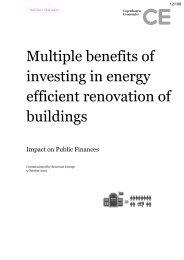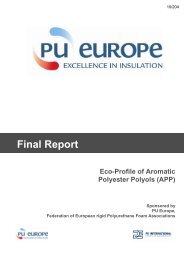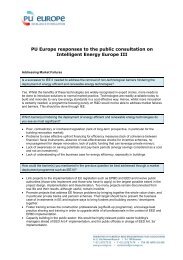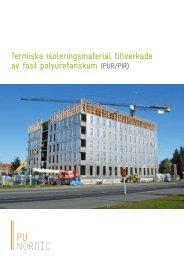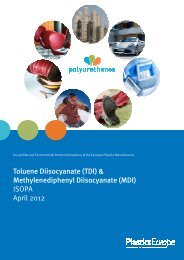BPIE: Europe's buildings under the microscope - PU Europe
BPIE: Europe's buildings under the microscope - PU Europe
BPIE: Europe's buildings under the microscope - PU Europe
Create successful ePaper yourself
Turn your PDF publications into a flip-book with our unique Google optimized e-Paper software.
Table 2C2 – A summary of selected financial programmes across <strong>Europe</strong><br />
Source: <strong>BPIE</strong> survey<br />
AUSTRIA - Federal promotion of extraordinary efficiency<br />
in <strong>buildings</strong><br />
In 2006, Austria’s federal and state governments launched a programme<br />
for residential <strong>buildings</strong> to achieve a consumption level of<br />
65kWh per square metre, falling to 25-45 kWh/m 2 by 2010, including<br />
incentives for use of renewable heating systems. The programme is expected<br />
to generate 10,000 additional jobs (Total budget: €1.78 billion).<br />
BELGIUM - Interest free loans to stimulate retrofitting in<br />
Wallonia region<br />
A 1-billion euro plan including energy efficiency renovations is to be<br />
adopted soon in Wallonia. The objective is to reduce energy bills and<br />
CO 2<br />
emissions, while creating 5,000 jobs by 2014. The programme covers<br />
private dwellings and public <strong>buildings</strong> including public housing,<br />
schools and municipal <strong>buildings</strong>. The renovations will benefit from private<br />
support up to 100% financing. In <strong>the</strong> case that <strong>the</strong> owner agrees<br />
to make several renovations, <strong>the</strong> costs not covered by <strong>the</strong> premiums<br />
will be interest-free loans.<br />
FINLAND - Energy audit programme<br />
Finland’s Energy Audit Programme (<strong>the</strong> EAP) is one of <strong>the</strong> oldest<br />
national energy efficiency grant schemes in place. EAP started as a<br />
subsidy policy in 1992 and has operated as a full-scale programme<br />
since 2004. It is a voluntary programme promoted by a 40 % to 50<br />
% subsidy on energy audits. The total amount of subsidies during<br />
<strong>the</strong> period of 1992-2007 has been €23.1M. Since 1992 some 6 800<br />
<strong>buildings</strong> have been audited. The cumulative savings during <strong>the</strong><br />
whole period 1992-2007 are approximately 360 million EUR and<br />
over 11 TWh, of which industry accounts for about 70 %.<br />
FRANCE - The sustainable development account<br />
(livret de developpement durable)<br />
It is a savings account that pays tax-free interest of 2.5% a year<br />
for investments of up to €6000. Toge<strong>the</strong>r with funds raised from<br />
<strong>the</strong> previous CODEVI account, total funding is expected to reach<br />
€60bn. Since January 2008, every bank must allocate at least 2 % of<br />
<strong>the</strong> total account to <strong>the</strong> improvement of <strong>the</strong> energy performance<br />
of <strong>the</strong> building. Preferential loans can be awarded to individuals,<br />
co-properties and entrepreneurs for <strong>the</strong> purchase and installation<br />
of: energy efficient boilers; <strong>the</strong>rmal insulation (walls, windows,<br />
shutters); <strong>the</strong>rmal regulation equipment; equipment producing<br />
energy from renewable sources; space and water heating equipment<br />
using wood or o<strong>the</strong>r biomass; heat pumps.<br />
GERMANY - Loans and subsidies from <strong>the</strong> reconstruction<br />
credit institute, KfW<br />
The government-owned banking group Kreditanstalt für Wiederaufbau<br />
(fW) plays a central role concerning promotion of energy<br />
savings and CO 2<br />
reduction in <strong>the</strong> building sector. Between 1990<br />
and <strong>the</strong> end of 2009 subsidies for at least 3.1 million homes were<br />
implemented. In 2009, total subsidies amounted to €16.9 billion,<br />
of which €10.6 billion was for energy efficiency and €6.3 billion for<br />
renewable energies. KfW offers subsidies and loans for new <strong>buildings</strong><br />
as well as energy efficient renovations that meet requirements<br />
of <strong>the</strong> quality label “Effizienzhaus” (efficient building).<br />
POLAND - Energy management in public sector<br />
“The Green Investment Scheme – Energy management in public sector”<br />
supports implementation of <strong>the</strong>rmal modernization projects in<br />
public services <strong>buildings</strong>, in particular: a. heat insulation of <strong>the</strong> <strong>buildings</strong>,<br />
b. replacement of windows and external doors, c. upgrading<br />
lighting and heating, ventilation and air-conditioning systems, d.<br />
drawing up technical documentation for <strong>the</strong> project, e. energy management<br />
systems in <strong>buildings</strong> and f. use of renewable energy sources.<br />
(Budget: PLN 555M as a subsidy (equivalent to 126M euro), PLN<br />
1110 bn (equivalent to 250M euro) in <strong>the</strong> form of a loan extended by<br />
<strong>the</strong> National Fund).<br />
SLOVAKIA - Energy efficiency and renewable energy<br />
finance facility<br />
The <strong>Europe</strong>an Bank for Reconstruction and Development (EBRD) in<br />
cooperation with <strong>the</strong> Slovak Government have financed a programme<br />
for local banks to provide loans between 20,000 EUR and 2,500,000<br />
EUR (as well as grants of 7.5-15% of <strong>the</strong> loan amounts), toge<strong>the</strong>r with<br />
free technical assistance, for private companies and housing associations<br />
implementing energy efficiency and renewable energy projects.<br />
SPAIN - Plan to boost energy services contracts<br />
(plan 2000 ese)<br />
The plan articulates a set of measures to reduce energy consumption<br />
in <strong>the</strong> targeted <strong>buildings</strong> by at least 20%. Alongside reductions<br />
in CO 2<br />
emissions and reduced energy dependence, <strong>the</strong> aim<br />
is to boost <strong>the</strong> market for ESCOs, <strong>the</strong>reby increasing stable employment.<br />
The implementation of <strong>the</strong> plan is expected to have a<br />
favourable impact, ei<strong>the</strong>r from <strong>the</strong> point of view of <strong>the</strong> expected<br />
energy savings, reduction in CO 2<br />
emissions, <strong>the</strong> cutback on energy<br />
dependence and <strong>the</strong> market boost of ESCOs, which will be translated<br />
into stable employment.<br />
SWITZERLAND - National building support programme<br />
of <strong>the</strong> climate cent foundation<br />
The Climate Cent Foundation (now <strong>the</strong> Buildings Programme) is<br />
funded by a charge levied on all petrol and diesel imports at a rate<br />
of 1.5 cent per litre. Support is for energy renovation of existing<br />
<strong>buildings</strong> envelopes, i.e. roofs, walls and windows. By October<br />
2010, 6750 projects had been completed and 118 million Swiss<br />
Francs had been paid out. Over <strong>the</strong> period 2008 to 2012, contracted<br />
projects will reduce 240000 tonnes of CO 2<br />
emissions at an average<br />
price of 790 Swiss Francs per tonne of CO 2<br />
.<br />
UK - Energy supplier obligations<br />
In force since 1994, <strong>the</strong>y initially applied to monopoly electricity<br />
suppliers in England and Wales, but were soon extended to cover<br />
suppliers in Scotland and N. Ireland, and <strong>the</strong>n, from 2000, gas suppliers<br />
throughout <strong>the</strong> UK. The scheme has also evolved from a levybased<br />
approach, where particular levels of expenditure per supplier<br />
were mandated, into one where, since competition was introduced<br />
into <strong>the</strong> retail sector in 1998-99, <strong>the</strong> obligation has shifted to meeting<br />
a carbon reduction target, without specifying <strong>the</strong> level of expenditure.<br />
Initially applicable to households and small-medium<br />
businesses, <strong>the</strong> scheme has applied to <strong>the</strong> residential sector only<br />
since 2000.<br />
<strong>Europe</strong>’s <strong>buildings</strong> <strong>under</strong> <strong>the</strong> <strong>microscope</strong> | 93







